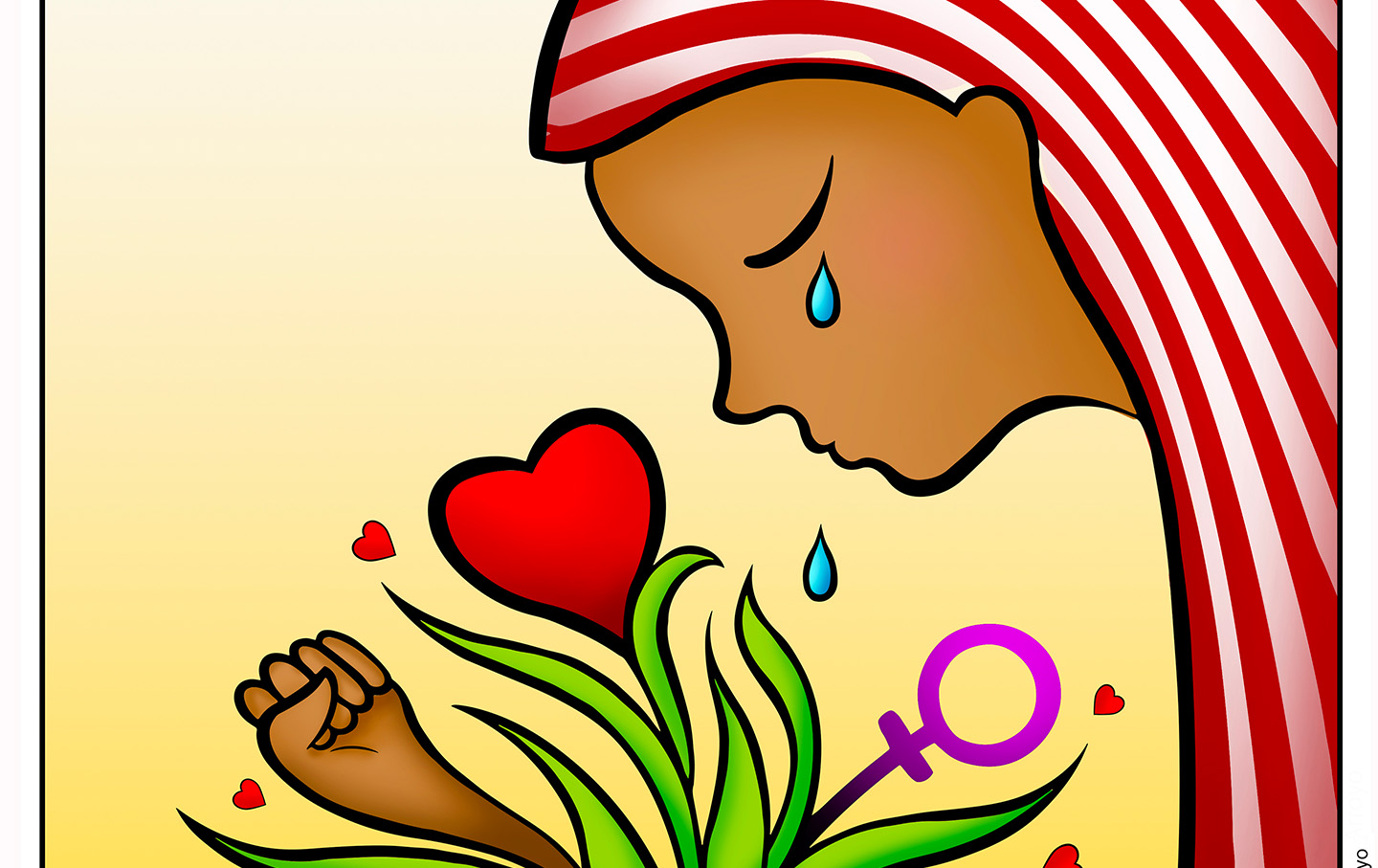The Grit and Resilience of Student Protesters
Gen Z is exhibiting the competence, control, and commitment that it has been castigated, as a generation, for lacking.
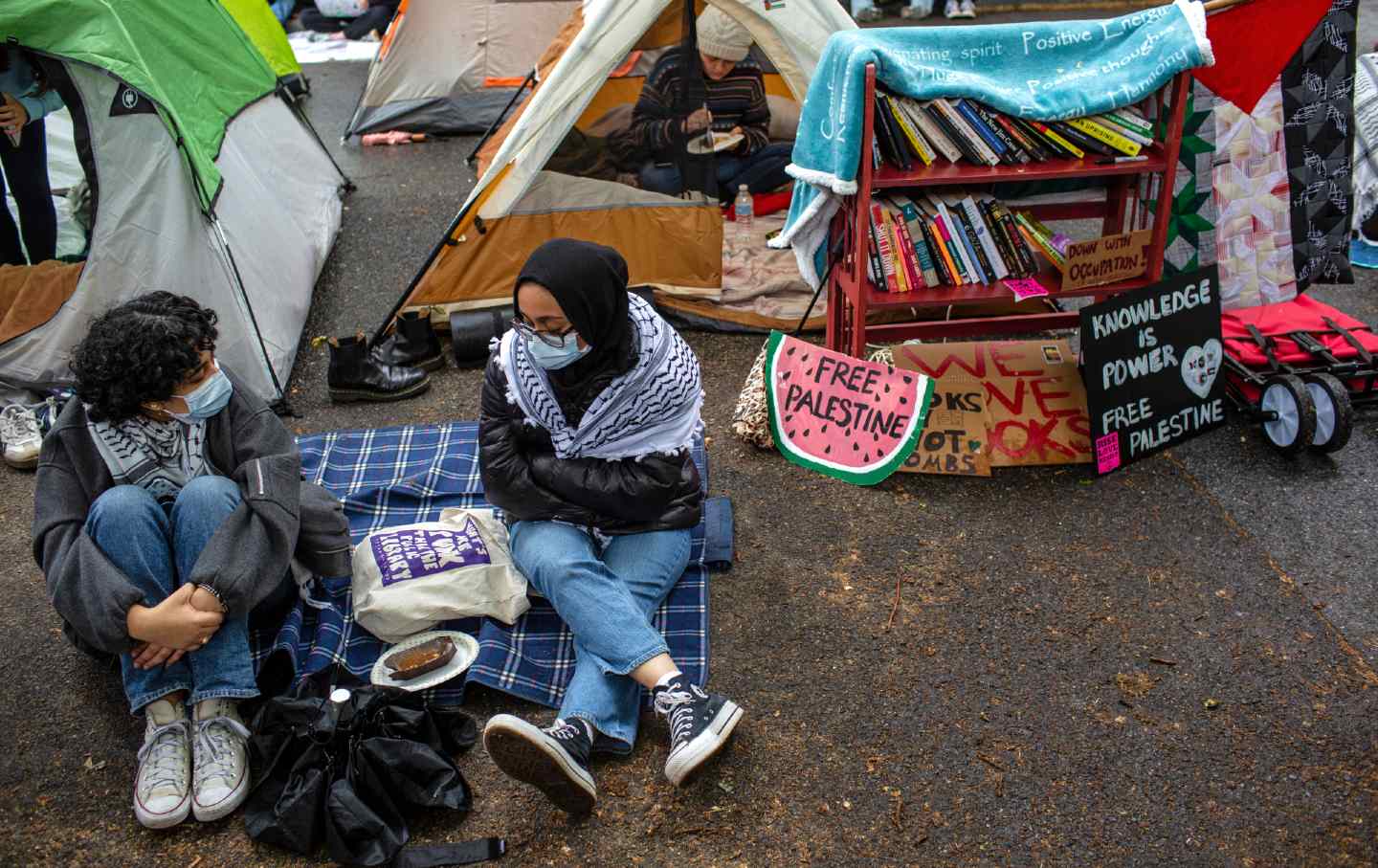
Students set up an encampment in solidarity with Palestine at George Washington University with other area universities in Washington, DC, on April 27, 2024.
(Probal Rashid / LightRocket via Getty Images)There is an irony in the fact that students protesting the Israel-Gaza war grew up hearing that they were “coddled” and “lack resiliency.” Critics scolded Gen Z for “needing safe spaces” and being “unable to cope” without trigger warnings. They claimed society was raising this generation in a “feminized” culture that’s left it weak and without purpose.
The early 2000s, the birth years for many of the students now protesting, marked the start of a period in which parents and educators worried that American children were not resilient enough. These concerns centered on children in upper income brackets attending elite institutions like the ones where protesters are now clashing with administrators and law enforcement. In 2006, one psychologist dubbed privileged children “America’s newly identified at-risk group,” leading to the warped conclusion that social vulnerabilities were resilience advantages for materially impoverished children. As Jonathan Haidt and Greg Lukianoff put it, in their 2018 book The Coddling of the American Mind, this generation has been “set up for failure.”
And yet, here they are, many of them the most privileged students in the country, risking their physical safety, academic standing, and futures by demanding accountability from powerful administrators. They are facing down militarized police and being threatened with arrest, tear gas, tasers, and brutality. They are, in fact, exhibiting the grit and competence, control and commitment that they have been castigated, as a generation, for lacking.
Resilience-shaming critics often conflate two different things: “resilience” as a process of adaptation and resilience as a proxy for a worldview. A worldview that is, at best, individualistic, hyper-masculinized, universalizing, and, at worst, invested in perpetuating supremacist norms and violent domination. That’s a lot to pack into “resilience,” I know, but bear with me.
The presumption behind the suggestion that younger generations lack resilience is that there is one “best way” to cope with hardship that is optimized for achieving personal well-being and success. This standard includes, among other factors, the belief that we grow from suffering and that only the fittest survive, through an amorphously defined “mental toughness.” Young people are supposed to be self-sufficient, optimistic, able to “bounce back” and quickly return to productivity and be grateful for what they have.
In this estimation, resilience is an individual trait demonstrated through self-sufficiency, control, and competence. Insofar as this notion of adaptation highlights independence and productivity, it takes for granted the emotional labor and care work that make both possible. It’s an ideal well-suited to competition, workplace needs, and winning, and it is invested in the belief that we personally “grow” from our suffering. In the process, however, this paradigm of resilience erases power, social context, and history. It depoliticizes circumstances of stress and crises. At its core, it is a resilience based on separation, competition, and domination.
The students protesting today have had to adapt to the world as it is. Younger people aren’t “different” and distressed, because they lack the right mindset or don’t understand what is happening around them. They are distressed, because they understand that the world is burning, and that adults have repeatedly failed them.
We are all familiar with the crises that this generation faces: climate catastrophe, widening economic inequality, highly visible and violent social injustices. They’re inheriting water, land, and bodies filled with chemicals. They’ve grown up, carrying bullies, racists, and rapists in their back pockets, as ever-present threats that live on their phones. They’ve watched delusional billionaires benefit from their addictions and anxieties. Their introduction to public and civic life—going to school—was shaped by gun violence and the constant threat of death. All of this before a pandemic derailed their adolescent lives. Covid-19 turned every social interaction into a life-or-death ethical dilemma, highlighting inequalities of wealth and poverty; gender, class and race; global power and powerlessness.
Notably, this generation grew up in accelerated sociotechnical environments. Digital natives, their understanding of the world has been shaped by visually intensive, networked, global media that has exposed them to intense social dynamics, fraught political debates, diverse perspectives, and viscerally raw depictions of current life and history. Their media—from Tumblr to TikTok—reveals connections between people and ideas and time. In the process, their way of adapting is relational, not individualistic. Older pundits routinely ignore or minimize our entanglements with one another and our environments, but students who are protesting, like so many of their peers, cannot. To them, our interdependencies are undeniable. Why would they adapt in ways that ignore those interdependencies?
It’s not as though they have a choice. Most traditional turning points in their lives—relationships and sex, school life, graduations—have been marred or prevented by crises that extend far beyond their personal environments or control.
As a foundation for envisioning the future, the hard truths of the past 25 years would depress even the most dedicated positive thinker. Escalating rates of mental distress, anxiety, depression, and self-harm are the source of legitimate and grave concern among parents, educators, and social scientists. But rates of despair and despondence have been rising for decades, during which time experts have pinned the cause on everything from late-stage capitalism and environmental toxicity to unregulated technology and (also unregulated) women’s liberation. If this generation suffers more, it could very well be the compression effects of acceleration and of exposure to the many indicators of what can feel like imminent collapse.
Popular
“swipe left below to view more authors”Swipe →Sometimes, however, distress is the appropriate response to crisis. It is a resilient response. In the traditional paradigm, optimism and stick-to-itness are paramount. But there are names for optimism when it exceeds its usefulness and leads to denialism: illusion and delusion among them. Younger people’s emotional distress signals instead the cognitive flexibility required to employ pragmatism, optimism, and pessimism strategically. Their protesting is, in fact, adaptive optimism. What after all is a protest if not the hopeful belief that you can change the future?
Student protesters also demonstrate another key resilience attribute: cognitive flexibility, which allows them to resist stereotypes and oppositional thinking, such as, for example, a victim/perpetrator binary. Students go out of their way to acknowledge the complexity of the Israel/Gaza conflict, recognizing that the current situation is shaped by historical, political, and social factors that defy simple, black-and-white categorization.
Consider, for example, that across justice movements—for Black Lives, against gun violence, for women’s rights, for peace—young people show that they are able to think in terms, as Holocaust scholar Michael Rothberg puts it, of our being “implicated subjects.” They are more honest about the ways we are enmeshed in harms by virtue of being socialized in, belonging to, and benefiting from systems that perpetrated and continue to perpetrate injustices. In the case of the current campus protests, they want to stop being implicated in a specific ongoing injustice and hold power accountable.
While media and administrators seem to cling to an ideal of faux “normalcy” in which injustices were ignored, these students are not. They are intent on repair, not restoration. They are well-versed in holding many truths at once and aware of how violence and oppressive systems make their way into not only institutions but interpersonal relationships as well. How else do you understand Jewish students holding Passover seders with classmates at university protest camps for peace and Palestinian rights and dignity?
These students are politically engaged, sophisticated thinkers who are using their life experiences and adapting to each other and to the planet in healthier, fairer ways: relationally, collectively, and purposefully.
None of this is to say that protesters and their protests are either absolutely ideologically or philosophically aligned. Mass movements are snarly, complicated messes, and no one person or group can define or contain them or people who attach themselves to them. There have been egregious acts of antisemitism on some campuses, and words and actions can, even if unintentionally, fall back on historically resonant dog whistles. However, pro-Palestinian students, many of whom are themselves Jewish, have been consistently outspoken in their denouncements of antisemitism while rejecting its evolving conflation with anti-Zionism.
As citizens who have grown up protesting, they are experts in exercising their free speech rights, almost always, peacefully. Already seasoned activists through repeated necessity, they strive to listen to others and to foreground historically marginalized voices. As a cohort, they evidence an ethics of care that leads them toward dialogue, not debate.
The truth is that critics of this generation are not addressing a problem of children who can’t cope and aren’t resilient, but one of children who refuse to conform. These students are highly resilient—they’re just resilient in a way that makes them ungovernable.
More from The Nation

Human Rights for Everyone Human Rights for Everyone
December 10 is Human Rights Day, commemorating the anniversary of the Universal Declaration of Human Rights (UDHR), one of the world's most groundbreaking global pledges.
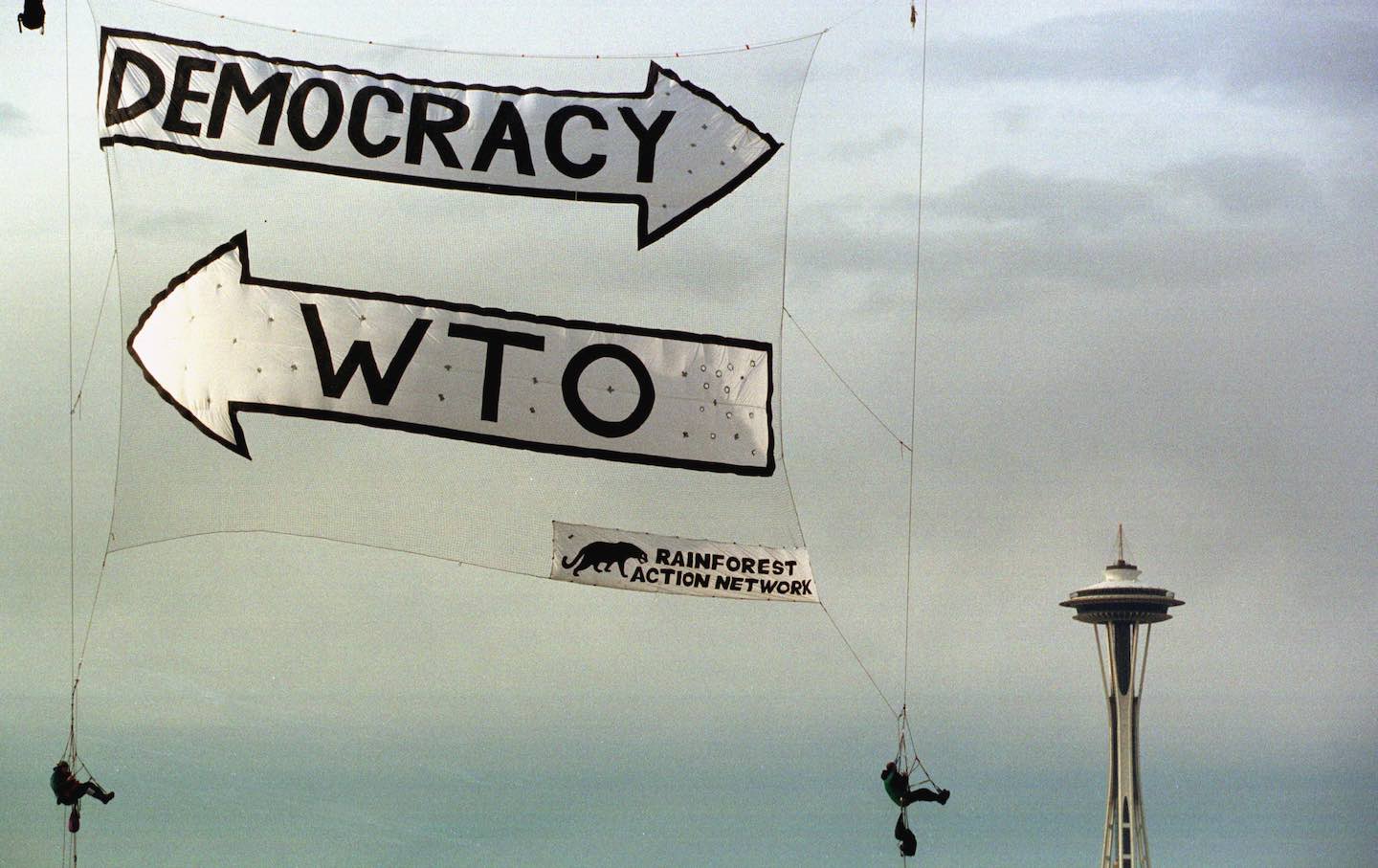
25 Years Ago, the Battle of Seattle Showed Us What Democracy Looks Like 25 Years Ago, the Battle of Seattle Showed Us What Democracy Looks Like
The protests against the WTO Conference in 1999 were short-lived. But their legacy has reverberated through American political life ever since.
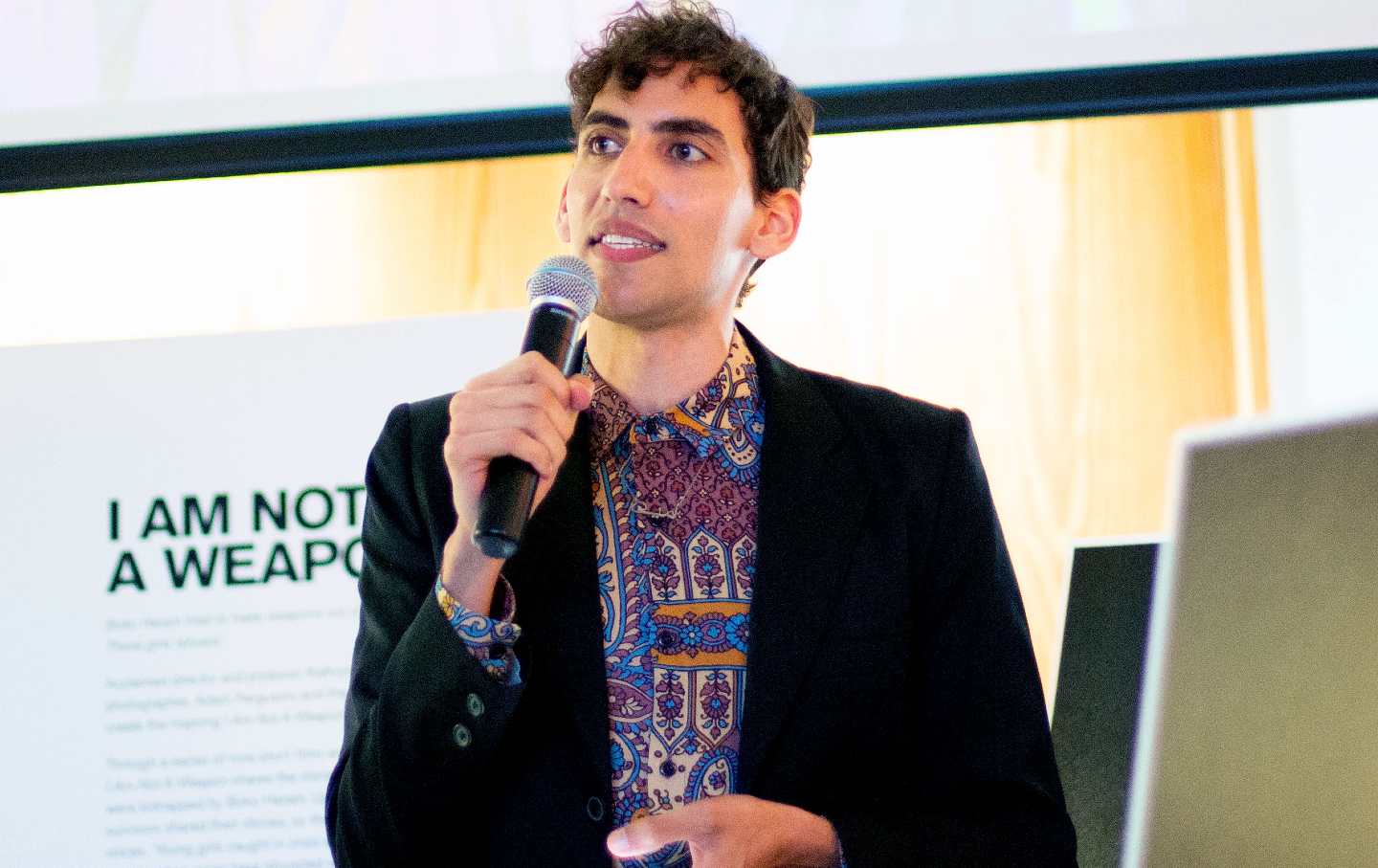
Hollywood’s Vocal Actors Union Goes Silent on a Gaza Ceasefire Hollywood’s Vocal Actors Union Goes Silent on a Gaza Ceasefire
Amin El Gamal, head of SAG-AFTRA's committee on Middle Eastern and North African members, has advocated for a statement supporting a ceasefire in Gaza—so far without success
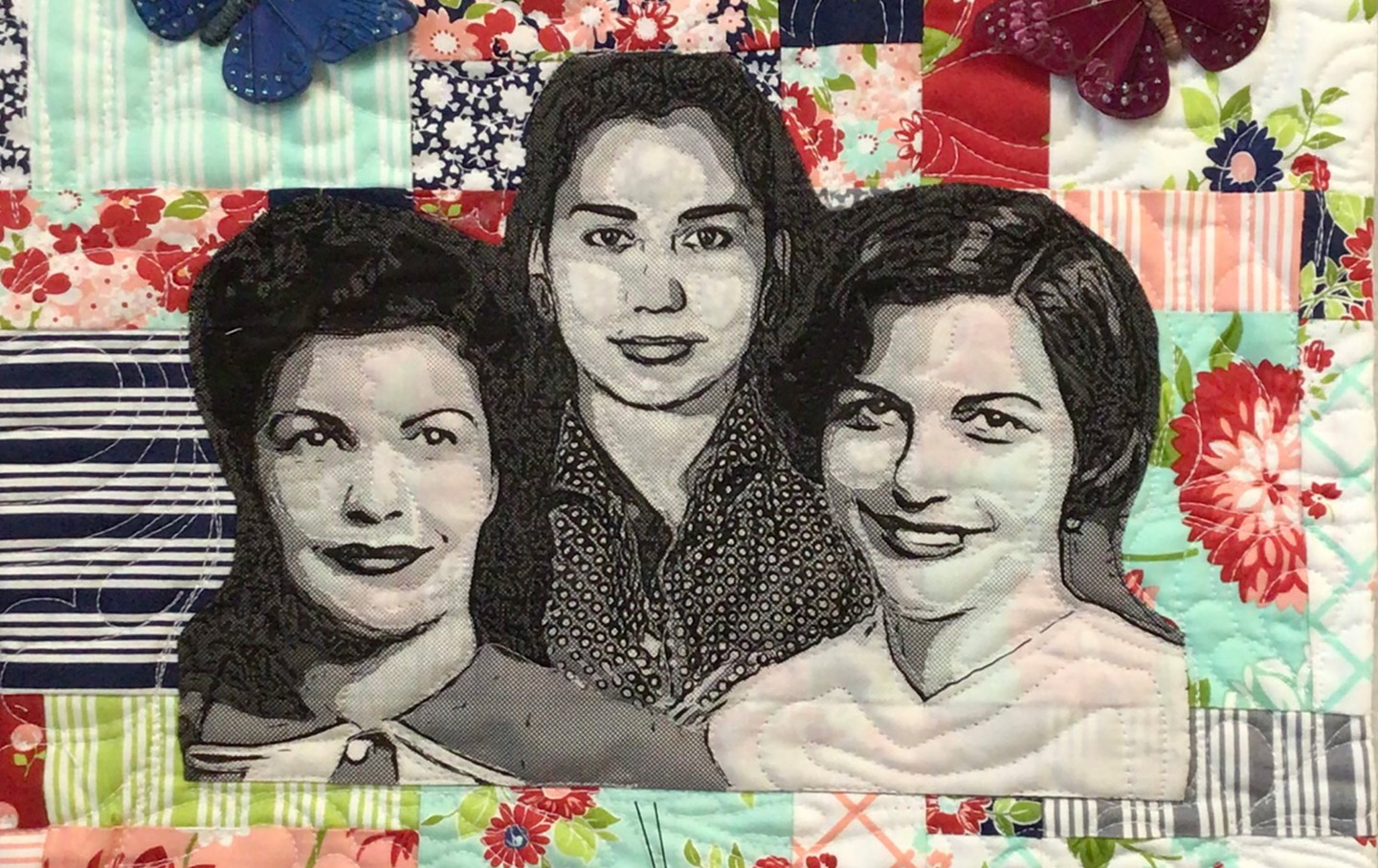
The Mirabal Sisters The Mirabal Sisters
Patria, Minerva, and María Teresa Mirabal were sisters from the Dominican Republic who opposed the dictatorship of Rafael Trujillo; they were assassinated on November 25, 1960, und...

What Will a Peace Movement Look Like Under Trump’s Second Presidency? What Will a Peace Movement Look Like Under Trump’s Second Presidency?
An all-hands-on-deck approach to the coming world of Donald Trump and crew is distinctly in order.

